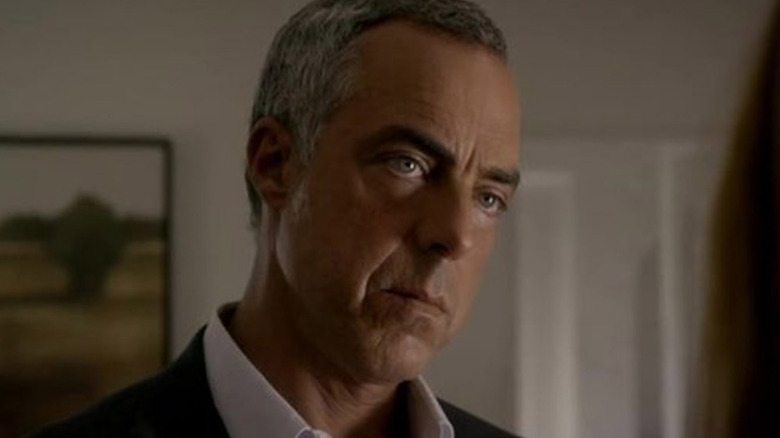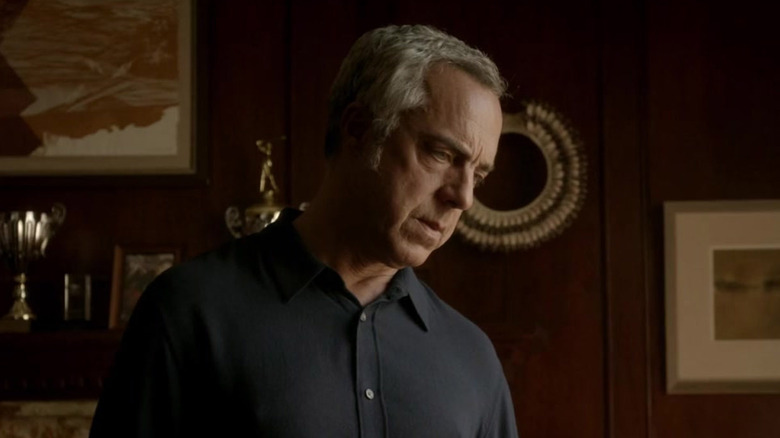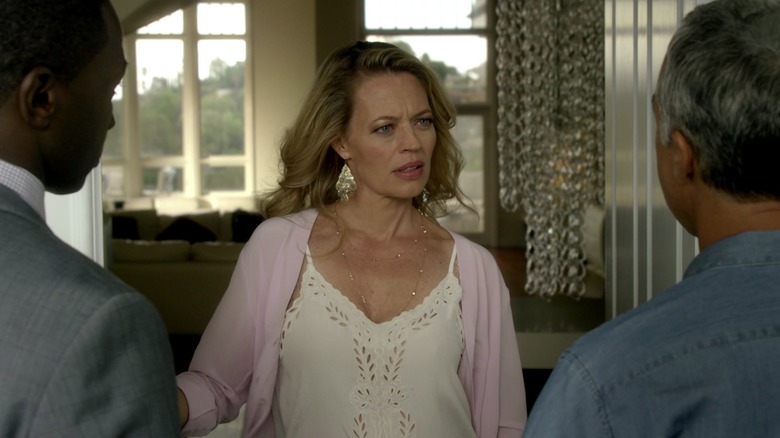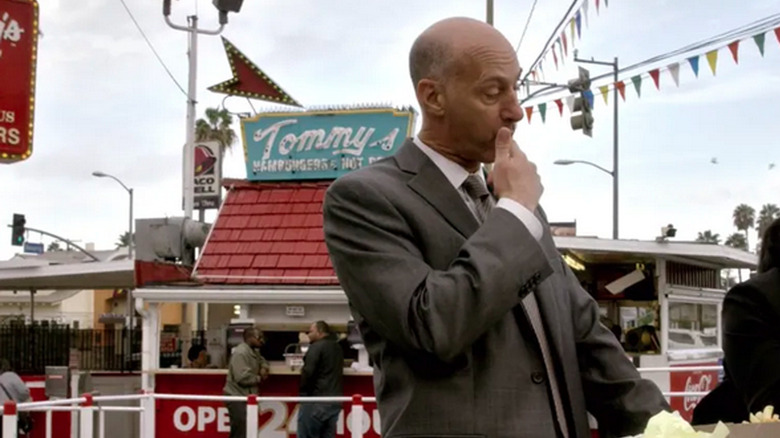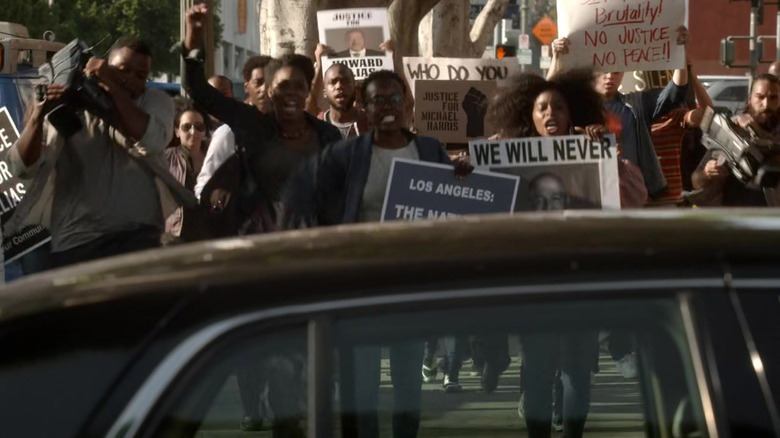The Untold Truth Of Bosch
"Bosch" is Amazon Prime Video's longest-running show, a stalwart offering that never seems to have a "moment" in the mainstream, despite being critically well-received. Collider called it "an almost aggressively un-flashy piece of prestige-adjacent television." "Bosch" is a series that always keeps its head down and does the work. The show has a 97% approval rating on Rotten Tomatoes and yet has only received one Emmy nomination, for Outstanding Main Title Design in 2015. It lost to "Manhattan."
But for fans of neo-Noir, morally complex stories about the police, and the city of Los Angeles, "Bosch" is a garden of earthly delights. Based on the books by veteran LA Times reporter Michael Connelly, "Bosch" stars Titus Welliver as the titular Hieronymous "Harry" Bosch. Bosch sometimes goes outside the law to extract his version of justice, a trait his fellow LAPD officers dislike in him (but can't seem to avoid themselves). Bosch is seven seasons of Original Tommy's burgers, kill parties, and a shiny glass house no police detective could afford.
(Loosely) based on the books
"Bosch" was adapted from the extensive series of books by veteran LA Times reporter Michael Connelly. Connelly had a hand in adapting the show, carrying over the vibes of the books more than specific plots. Most seasons adapt storylines from two or three of Connelly's books. For example, Season 1 is based on "City of Bones," "Echo Park," and "The Concrete Blonde."
Connelly was a crime reporter for the Times, so he has the bona fides to back up his novels. He says Bosch was based in part on the cops he worked with (and against) at the Times. "Harry is an amalgamation of several real cops I knew as a police reporter," he told Novel Suspects. Though, befitting a series set in LA, Harry Bosch also takes inspiration from several fictional gumshoes. "I think and hope there are parts of Philip Marlowe in him, as well as Lew Archer, Dirty Harry Callahan, Frank Bullitt, and many others," he said. Speaking of Marlowe, Connelly actually wrote some of his "Bosch" works while living in the High Tower Apartments, Marlowe's home in Robert Altman's "The Long Goodbye," per The LAist.
Character actors getting their due
"Bosch" is full to the brim with god-tier ensemble players, actors that are fourth or fifth billed in almost every show imaginable. It stars Titus Welliver, who has worked for decades as a character actor. Welliver played the Man in Black on "Lost" and has played his share of cop heavies on other shows. One of his first big TV roles was as Dr. Mondzac, a Bellvue physician who regularly interacted with the cops of "NYPD Blue." He treated Sipowicz (Dennis Franz) for erectile dysfunction and also helped cover for him when Sipowicz lost his gun in a drunken altercation.
The Chief of Police on "Bosch" is played by Lance Reddick, who shone as the enigmatic head of the Fringe division on "Fringe." He also played characters on some of the first prestige TV shows, "Oz" and "The Wire." Reddick brings his imposing gravitas to every role, including a Funny or Die short where he goes off on his underlings at a Toys R Us. Another "Wire" alum is Jamie Hector, who plays Bosch's frequent partner.
"Bosch" is dude-heavy, but the women on the show are all played by veteran character actors as well. Bosch's immediate supervisor Lieutenant Grace Billets is played by Amy Aquino, who you may recognize from "ER" or as Bucky's therapist from "The Falcon and the Winter Soldier." Bosch's ex-wife, played by Sarah Clarke, was iconic as another cop's ex, Renee Swan in the "Twilight" franchise. And "Star Trek: Picard" and "Voyager" star Jeri Ryan had a recurring role as an ex-porn star. The cast is full of folks that podcast "Who? Weekly" would categorize as "Who" stars. You know their faces, but if someone said "Sarah Clarke" to you, you'd go "Who?" That is, unless you love the ex-wives of fictional police officers.
LA's deep well of crime
Connelly told Novel Suspects that he named Bosch after painter Hieronymous Bosch because he felt Bosch's twisted vistas were a perfect allegory for Los Angeles, a city that has aspects of Bosch's most famous painting. "The Garden of Earthly Delights" depicts people having fun on earth and also being surreally tortured in Hell. "I was casting my Bosch adrift in a hellish landscape of present-day Los Angeles," he said.
Los Angeles is defined by its famous crimes in a way other American cities are not. The Manson murders, Rodney King beating, Black Dahlia murder, and theft of water by William Mullholland haunt the city. The fact that some of these crimes were committed by LA higher-ups is echoed by the corruption in Bosch's department.
Bosch's mother was a sex worker whose murder he sought to solve for decades. This mirrors crime writer James Ellroy, whose mother's murder remains unsolved. Ellroy wrote "LA Confidential" and "The Black Dahlia," helping to solidify Los Angeles' rep as a crime-soaked land of noir. According to the Guardian, Ellroy's fascination with the murder of Elizabeth Short, aka the Black Dahlia, began the year after his mother was murdered.
Using LA to the fullest
Harry Bosch is inextricably linked to Los Angeles, and "Bosch" illustrates this by using LA institutions as settings for its melodrama. Eater LA mapped the locations, showing how the city has shaped the narrative of the series. Bosch takes a meeting with police deputy chief Irv Irving at Musso & Frank, the oldest restaurant in Hollywood, per LA Magazine. Founded in 1919, Musso & Frank was a favorite watering hole of everyone from Mary Pickford to Frank Sinatra. It can also be seen in "Once Upon a Time in Hollywood" and "Ocean's Eleven."
Bosch also drinks at Boardner's by Labelle, one of the Black Dahlia's regular watering holes (via HuffPost). The bar now adjoins a goth/kink club, so you have to imagine Bosch waiting for the bathroom next to someone in a leather corset. Other LA landmarks include Formosa Cafe (where John Wayne used to pass out), Original Tommy's, and late great karaoke spot Smog Cutter.
A Season 3 episode is named after local Mexican chain El Compadre, where the LAPD squad went for a "kill party" in Season 1. That the cops of "Bosch" celebrate killing a suspect shows you what kind of Los Angeles the show wishes to depict.
The changing rep of LA law enforcement
Harry Bosch marks all of his time in LA as "BK and AK," meaning "Before Rodney King" and "After Rodney King," as noted on CrimeReads. Bosch is a show that tries to wrestle with policing in Los Angeles, a town that has long been emblematic of police brutality. The show opens with Bosch possibly having shot an unarmed suspect, and every season involves the LAPD defending itself from critique within and without. According to NPR, the SWAT team was invented in Los Angeles after the Watts riots. Those riots were started after what community members judged to be undue force used by the police, so it's ironic that the police response was to further arm themselves. Thus, the militarization of the police throughout the country was modeled first in Los Angeles.
Bosch's tattoos are prominently featured on the show, which may hit viewers differently after learning about the tattoos of the Los Angeles Sheriff's Department deputy gangs, exhaustively reported by Knock LA.
"Bosch" takes the tricky position of exploring the malfeasance of the LAPD while still trying to find heroism within it. The cops of "Bosch" are flawed people. They genuinely want to help people, but they also hurt many people in their narrow-minded view of what justice truly is. Like the paintings of that other Bosch, "Bosch" refuses notions of simple good and evil.
